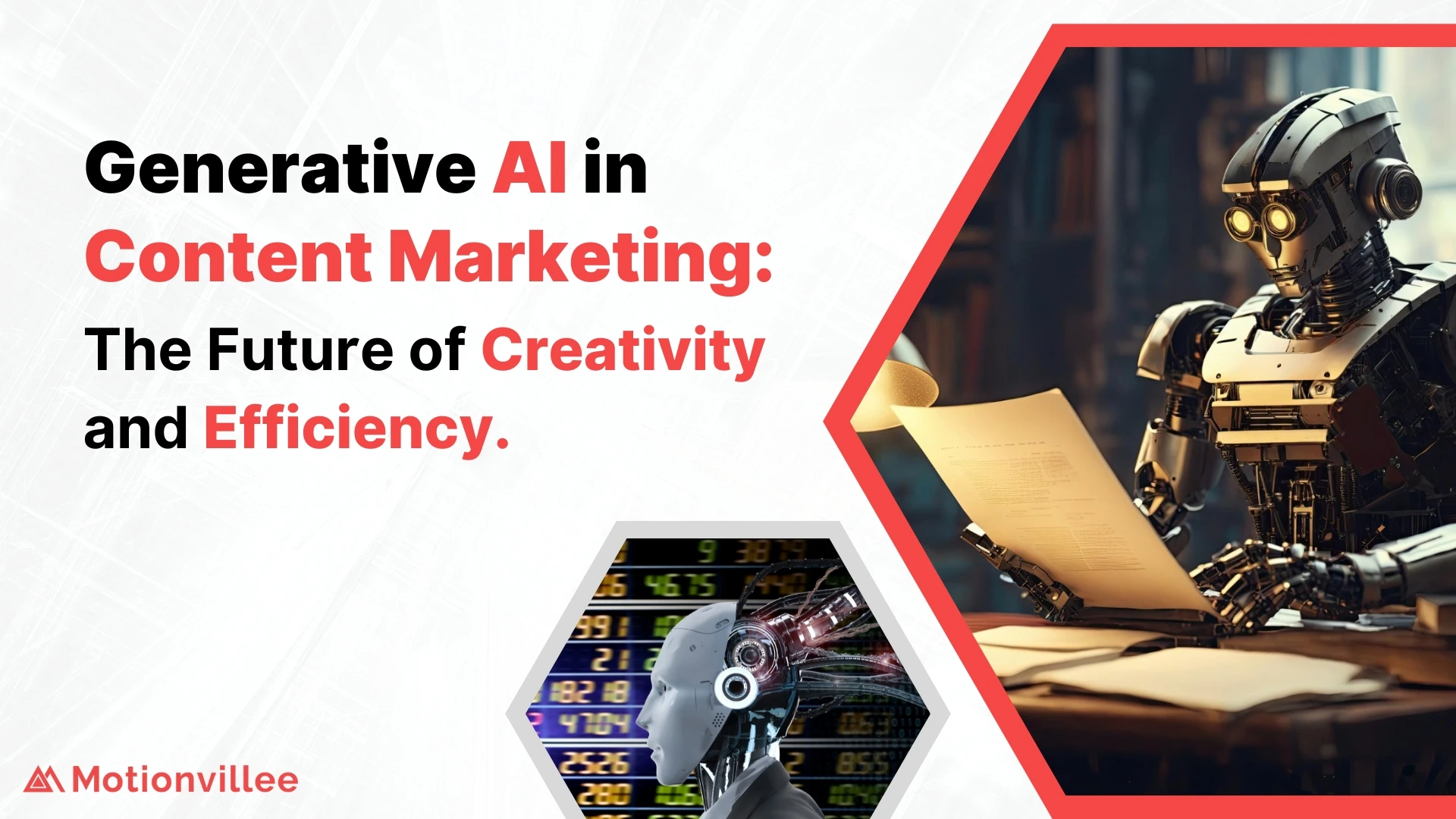The rapid development of generative artificial intelligence (AI) has disrupted industries across the board, with content marketing being among the fields experiencing a profound transformation.
As brands and marketers aim to deliver personalized and high-quality content to increasingly demanding audiences, generative AI presents a new avenue to enhance productivity and reach. Studies by the International Journal of Information Management and Deloitte Digital illustrate that while generative AI offers new opportunities, it also brings unique challenges that require thoughtful integration into marketing workflows.
This article explores these studies’ findings to understand generative AI’s impact on content marketing, the strategies for harnessing its potential, and the considerations marketers must bear in mind to use this technology responsibly.
Generative AI: A Game Changer for Content Production
Generative AI tools like GPT-3, Chat GPT, and DALL-E are capable of producing sophisticated text, imagery, and multimedia content. Such tools are designed to generate human-like language or visuals based on prompts, offering a new resource for marketers in need of large-scale content creation.
Deloitte Digital’s research highlights that nearly 26% of marketers have already adopted generative AI for content production, with an additional 45% expecting to integrate it by the end of 2024.
The Deloitte report also shows that companies using generative AI report an average efficiency increase of 12%, allowing marketers to save hours previously spent on repetitive tasks, which can now be allocated to strategic planning and creative refinement
Generative AI’s potential to enhance productivity is underscored by its ability to generate a high volume of diverse content quickly. For example, AI can assist in drafting social media posts, product descriptions, email campaigns, and even initial versions of more complex materials like articles or reports.
By automating these repetitive content creation tasks, brands can respond more promptly to market changes, trends, and customer demands.
However, the technology’s benefits extend beyond efficiency: generative AI also allows for high levels of personalization, helping brands tailor content to specific audience segments with minimal manual intervention.
The Role of Personalization in Modern Content Marketing
In the highly competitive digital marketing landscape, personalization has become a cornerstone of effective content marketing. Audiences expect relevant, tailored content that speaks directly to their needs and preferences.
Deloitte’s research emphasizes that companies that incorporate generative AI into their content strategies are better positioned to create customized experiences for different customer segments.
With AI’s ability to analyze vast datasets and recognize patterns, it becomes easier for brands to align content with individual customer profiles, behaviors, and preferences. This not only enhances the user experience but also builds stronger connections between the brand and its customers
For instance, a retail brand could use generative AI to produce personalized product recommendations and tailored email campaigns that cater to customers’ unique tastes.
AI-powered personalization also enables companies to target ads and marketing materials based on demographics, browsing history, and purchase patterns, resulting in more effective and engaging campaigns. By automating this aspect of marketing, companies can increase customer satisfaction and loyalty without placing additional demands on human resources.
Balancing Efficiency with Brand Authenticity
Despite the advantages of generative AI, the technology is not without its limitations. The International Journal of Information Management article titled “So What if ChatGPT Wrote It?” explores the ethical and strategic considerations of using AI-generated content.
According to this study, while AI can streamline content creation, it also introduces risks related to authenticity, quality control, and brand consistency. Because AI relies on existing data and patterns, there is a risk that generated content could lack the nuanced understanding and emotional resonance that human-created content often delivers
One of the most pressing concerns for marketers is ensuring that AI-generated content aligns with a brand’s identity and voice. As Deloitte’s research points out, generative AI outputs can vary based on the prompts given, sometimes producing content that feels inconsistent with brand values.
This variability can pose challenges for marketers aiming to maintain a cohesive brand image across different channels. To address these concerns, many experts recommend a hybrid approach where generative AI serves as an initial content creator, with human marketers refining and personalizing the material to ensure it aligns with brand standards and resonates with the intended audience.
Legal and Ethical Considerations in AI-Driven Marketing
Generative AI’s ability to mimic human creativity raises important questions regarding intellectual property, authenticity, and ethics. As highlighted in the International Journal of Information Management, marketers must navigate these challenges thoughtfully to prevent unintended consequences.
One significant ethical issue is the potential for generative AI to perpetuate biases embedded in its training data. For example, if an AI model is trained on content with gender or racial stereotypes, it may inadvertently reproduce these biases in its output, thereby harming the brand’s reputation and alienating segments of the audience
Intellectual property is another area of concern. Generative AI’s ability to produce unique content raises questions about copyright and ownership. If an AI-generated piece of content infringes on existing copyrights, brands could face legal repercussions.
Additionally, consumers are becoming increasingly aware of AI-generated content and may view it less favorably if it is not transparently labeled as such. To mitigate these risks, brands should develop clear guidelines and ethical standards for using AI-generated content. Ensuring transparency about AI’s role in content production can help brands maintain consumer trust while adhering to legal standards.
Embracing a Hybrid Model for Optimal Results
Given both the benefits and limitations of generative AI, a hybrid approach to content marketing is gaining popularity. This model leverages AI to handle the initial stages of content creation—such as drafting, generating ideas, or suggesting improvements—while human marketers oversee and refine the final product.
According to Deloitte Digital, brands that integrate AI agents into their workflows while keeping human oversight report the highest levels of efficiency and brand satisfaction. By positioning AI as an “assistant” rather than a replacement for human creativity, companies can scale their content production without sacrificing quality or authenticity
For example, a marketing team might use AI to draft an initial version of a social media post, which a human marketer then edits to ensure it meets brand guidelines. This collaborative process can save time while ensuring that the content retains the emotional impact and nuance that audiences expect. Moreover, as AI technology advances, it may become more effective at aligning with brand voices, further enhancing its value in a hybrid workflow.
Preparing for the Future of AI in Content Marketing
Looking forward, the role of generative AI in content marketing is expected to grow. As AI models become more sophisticated, they will likely be able to perform more complex tasks and better understand brand-specific nuances.
However, for marketers, staying updated on AI developments and understanding the limitations and ethical implications of these tools is crucial. Companies will also need to invest in training programs that equip marketing teams with the skills needed to work effectively with AI.
As content marketing continues to evolve, marketers who embrace AI thoughtfully and ethically will be better positioned to leverage its full potential. With careful integration, generative AI can serve as a valuable asset in creating meaningful, personalized, and impactful content that resonates with modern audiences.
Conclusion: The Future of Content Marketing is Hybrid
Generative AI represents a powerful tool for content marketing, offering unprecedented efficiency, scalability, and personalization. However, it is not a panacea and cannot fully replace the creative insight, empathy, and brand understanding that human marketers bring to the table.
By adopting a hybrid model that combines the strengths of AI with human expertise, brands can optimize their content production, engage their audiences more effectively, and navigate the ethical complexities of using AI responsibly.
In the end, the successful application of generative AI in content marketing will depend on brands’ willingness to invest in thoughtful governance frameworks and ongoing training. As AI technology continues to advance, the brands that balance innovation with responsibility will lead the way in an increasingly AI-driven content landscape.
Ready to create videos that turn viewers into customers? Motionvillee is your partner in cutting through the noise and making your brand shine. Whether you’re launching your first video campaign or boosting brand visibility, we’ve got you covered. Let’s craft videos that engage your audience and deliver qualified leads straight to your sales funnel. Get in touch today!





